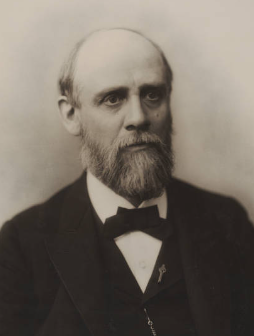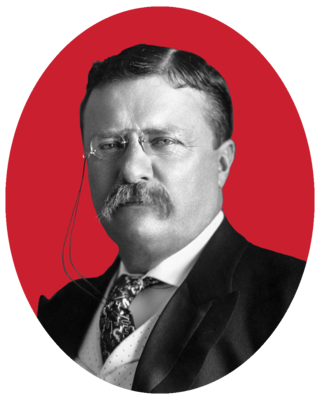
Presidential elections were held in the United States on November 3, 1908. Republican Party nominee William Howard Taft defeated threetime Democratic nominee William Jennings Bryan. Incumbent President Theodore Roosevelt honored his promise not to seek a third term, and persuaded his close friend, Taft, to become his successor. With Roosevelt's support, Taft won the presidential nomination at the 1908 Republican National Convention on the first ballot. The Democratic Party nominated Bryan, who had been defeated twice previously, in 1896 and 1900, by Republican William McKinley.

Harry Micajah Daugherty was an American politician. A key Republican political insider from Ohio, he is best remembered for his service as Attorney General of the United States under presidents Warren G. Harding and Calvin Coolidge, as well as for his involvement in the Teapot Dome scandal during Harding's presidency.

Joseph Benson Foraker was an American politician of the Republican Party who served as the 37th governor of Ohio from 1886 to 1890 and as a United States senator from Ohio from 1897 until 1909.

George Hoadly was a Democratic politician. He served as the 36th governor of Ohio.

The 1914 United States Senate elections were held on November 3, 1914. These were the first regularly scheduled elections held following the ratification of the Seventeenth Amendment to the United States Constitution in 1913, which required that all seats up for election be popularly elected, rather than chosen by their state legislatures. Thus, it was the first time that elections were generally scheduled on Election Day to coincide with the U.S. House elections. The 32 seats of Class 3 were contested in regular elections in 1914. Special elections were also held to fill vacancies. These elections occurred in the middle of Democratic President Woodrow Wilson's first term.

The 1908 Republican National Convention was held in Chicago Coliseum, Chicago, Illinois on June 16 to June 19, 1908. It convened to nominate successors to President Theodore Roosevelt and Vice President Charles W. Fairbanks.

The 1904 Republican National Convention was held in the Chicago Coliseum, Chicago, Cook County, Illinois, on June 21 to June 23, 1904.
The Massachusetts Republican Party (MassGOP) is the Massachusetts branch of the U.S. Republican Party.

Richard Almgill Harrison was an American politician and jurist from Ohio. He was elected to succeed Thomas Corwin in the United States House of Representatives, serving from 1861 to 1863. He was several times considered for a seat on the Supreme Court of Ohio, but declined the honor.

The 1885 New York state election was held on November 3, 1885, to elect the governor, the lieutenant governor, the secretary state, the state comptroller, the attorney general, the state treasurer and the state engineer, as well as all members of the New York State Assembly and the New York State Senate.
The 1884 Democratic National Convention was held July 8–11, 1884 and chose Governor Grover Cleveland of New York their presidential nominee with the former Governor Thomas A. Hendricks of Indiana as the vice presidential nominee.

The 1896–97 United States Senate elections were held on various dates in various states. As these U.S. Senate elections were prior to the ratification of the Seventeenth Amendment in 1913, senators were chosen by state legislatures. Senators were elected over a wide range of time throughout 1896 and 1897, and a seat may have been filled months late or remained vacant due to legislative deadlock. In these elections, terms were up for the senators in Class 3.
A Massachusetts general election was held on November 8, 1960, in the Commonwealth of Massachusetts.

The 1914 United States Senate election in Ohio was held on November 3, 1914. Republican nominee Warren G. Harding, future President of the United States, defeated Democratic nominee Timothy S. Hogan and Progressive Arthur L. Garford to succeed retiring incumbent Republican senator Theodore E. Burton.

On January 12, 1898, the Ohio General Assembly met in joint convention to elect a United States Senator. The incumbent, Mark Hanna, had been appointed by Governor Asa Bushnell on March 5, 1897, to fill the vacancy caused by the resignation of John Sherman to become Secretary of State to President William McKinley. Hanna's appointment was only good until the legislature met and made its own choice. The legislature elected Hanna over his fellow Republican, Cleveland Mayor Robert McKisson, both for the remainder of Sherman's original term and for a full six-year term to conclude in 1905.

The 1908 U.S. presidential election occurred in the backdrop of the progressive achievements of U.S. President Theodore Roosevelt's second term as well as against the U.S. recovery following the Panic of 1907. In this election, Roosevelt's chosen successor, Republican William Howard Taft, ran in large part on Roosevelt's progressive legacy and decisively defeated former congressman and three-time Democratic U.S. presidential candidate William Jennings Bryan. Overall, the 1908 presidential campaign and election were about labor issues, trusts, campaign finance reform, imperialism, and corruption.
A Massachusetts general election was held on November 6, 1956, in the Commonwealth of Massachusetts.

The 1889 Ohio gubernatorial election was held on November 5, 1889. Democratic nominee James E. Campbell defeated incumbent Republican Joseph B. Foraker with 48.91% of the vote.

The 1887 Ohio gubernatorial election was held on November 1, 1887. Incumbent Republican Joseph B. Foraker defeated Democratic nominee Thomas E. Powell with 47.73% of the vote.

The 1883 Ohio gubernatorial election was held on October 9, 1883. Democratic nominee George Hoadly defeated Republican nominee Joseph B. Foraker with 49.87% of the vote.



















